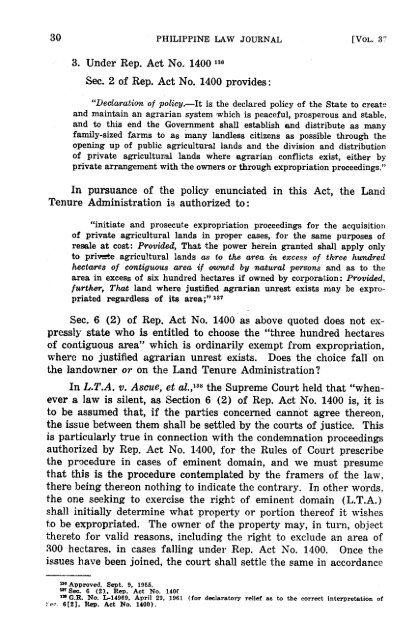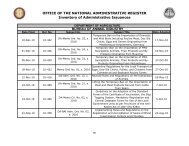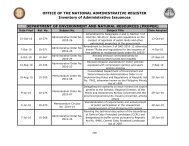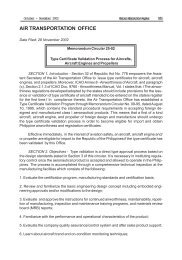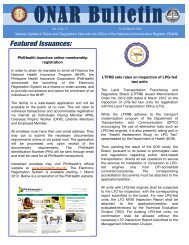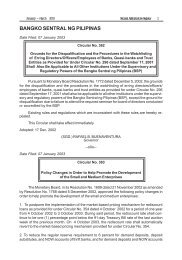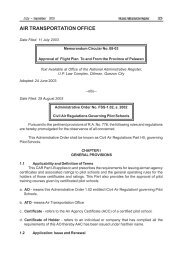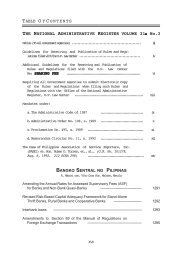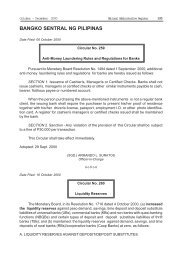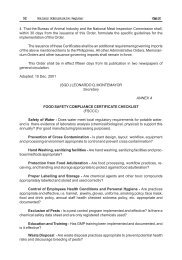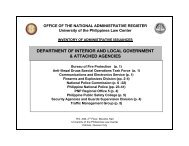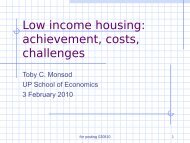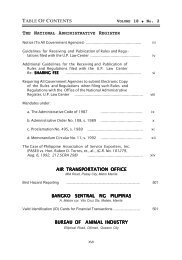PLJ volume 37 number 1 -01- Deogracias Eufemio
PLJ volume 37 number 1 -01- Deogracias Eufemio
PLJ volume 37 number 1 -01- Deogracias Eufemio
Create successful ePaper yourself
Turn your PDF publications into a flip-book with our unique Google optimized e-Paper software.
3. Under Rep. Act No. 1400 136<br />
Sec. 2 of Rep. Act No. 1400 provides:<br />
"Deolaration of policy.-It is the declared policyof the State to create<br />
and maintain an agrarian system which is peaceful, prosperous and stable,<br />
and to this end the Government shall establish and distribute as many<br />
family-sized f,arms to as many landless citizens as possible through the<br />
opening up of public agricultural lands and the division and distribution<br />
of private agricultur.al lands where agrarian conflicts exist, either by<br />
private arrangement with the owners or through expropriation proceedings."<br />
In pursuance of the policy enunciated in this Act, the Land<br />
Tenure Administration is authorized to:<br />
"initiate and prosecute expropriation proceedings for the acquisition<br />
of private agricultural lands in proper cases, for the same purposes of<br />
resale at cost: Provided, Tha,t the power herein granted shall apply only<br />
to pri~...e agricultural Lands as to the area in excess of three hundred<br />
hectMesof contiguous area if lorwn.edby natural pers.ons a.nd as to the<br />
area in excess of six hundred hectares if owned by corporation: Provided,<br />
further, That land where justified ,agrarian unrest exists may be expropriated<br />
regardless of its area;" 1<strong>37</strong><br />
Sec. 6 (2) of Rep. Act No. 1400 as above quoted does not expressly<br />
state who is entitled to choose the "three hundred hectares<br />
of contiguous area" which is ordinarily exempt from expropriation,<br />
where no justified agTarian unrest exists. Does the choice fall on<br />
the landowner or on the Land Tenure Administration'l<br />
In L.T.A. v. Ascue, et ai.,m the Supreme Court held that "whenever<br />
a law is silent, as Section 6 (2) of Rep. Act No. 1400 is, it is<br />
to be assumed that, if the parties concern~d cannot agree thereon,<br />
the issue between them shall be settled by the courts of justice. This<br />
is particularly true in connection with the condemnation proceedings<br />
authorized by Rep. Act No. 1400, for the Rules of Court prescribe<br />
the procooure in cases of eminent domain, and we must presume<br />
that this is the procedure contemplated by the framers of the law,<br />
there being thereon nothing to indicate the contrary. I'n other words,<br />
the one seeking to exercise the right of eminent domain (L.T.A.)<br />
shall initially determine what property or portion thereof it wishes<br />
to be expropriated. The owner of the property may, in turn, object<br />
thereto for valid reasons, including the right to exclude an area of<br />
ROO hectares. in cases falling under Rep. Act No. 1400. Once the<br />
issues have been joined, the court shaH settle the same in accordance<br />
,.. Approved, Sept. 9. 1955.<br />
In Sec. 6 (2).• Rep. Act No. Hor<br />
n. G.R. No. L-14969. April 29. 1961 (for declaratory relief as to the correct interpretation of<br />
ceo 6[21. Rep. Act No. 1400).


